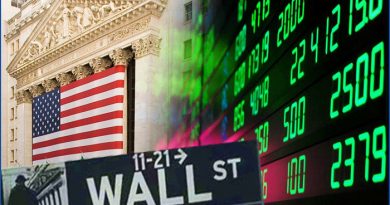Shares staunch bleed after worst selloff since January
LONDON (Reuters) – Investors sought to staunch the bleed on Wednesday after world stocks suffered their worst rout since January and U.S. and European borrowing costs raced to their highest in months.
Asia managed to slow the falls and the pan-European STOXX 600 index bounced 1% in early trading after shedding 2.2% on Tuesday and after a heavy selloff in U.S. tech stocks consigned Wall Street to its steepest drop since mid-July. [.N]
The global benchmarks for borrowing costs – the yields on U.S. and German government bonds – also edged lower after their spikes had helped fuel the volatility. Traders were also waiting to hear from the heads of the European Central Bank, the U.S. Federal Reserve, Bank of Japan and Bank of England who speak together at an ECB event later here.
“The question that will come in the next 10 days is will the U.S. Treasury yield keep pushing above 1.5%,” said Societe Generale strategist Kenneth Broux. “That was a sort of breaking point for broader risk assets when stops went off and the selloff started accelerating.”
Those Treasury yields have jumped roughly 20 basis points over the last week and are set for their biggest monthly jump since March. German and British 10-year bond yields are set for the biggest month rise since February — gilt yields have soared almost 40 bps this month to 1%.
Broux said the question for October and the rest of the year would be whether the inflation pressures that central banks train their focus on start to abate. “The 1.5% level (on U.S. Treasuries) is really pivotal,” he said.
In the currency markets, the run up in yields, prompted by the signs that some Fed members want to start moving interest rates up next year, saw the dollar touch an 18-month high against the yen and set its highest level of the year versus other major peers. [FRX/]
It is also on course for its best year since 2015 just as doubts re-emerge about the global recovery from the COVID pandemic, Washington is bogged down in debt ceiling talks that could lead to a government shutdown. China is also grappling with a power crunch and property sector worries that have hit its economy.
QUARTER OF STRAIN
U.S. Futures suggested a risk-friendlier mood could return on Wall Street later too. S&P 500 e-minis were up 0.6% and those for the Nasdaq were up 0.8% after that index was pounded 3.6% on Tuesday by heavy selling of super-sized tech firms such as Google, Amazon and Microsoft. [.N]
Overnight Asia-Pacific shares had managed to restrict falls to 1.2%. Not including Japan, the region was heading for a 9.4% decline for the third quarter, its worst quarterly performance since the first three months of 2020, when global markets were roiled by the initial spread of COVID-19.
MSCI’s 50-country ACWI world stocks index is heading for its first red quarter since then too.
Other standout moves have been a 60% surge in gas prices and coffee beans have jumped 25% for second quarter in a row. The Baltic Dry index of global freight prices has surged 40% to add to 50% and 65% rises in previous two quarters, while China’s woes have sent iron ore crashing 45%, which will be its worst quarter on record.
“We still see inflation as a risk, but our base case is that it will be transitory and come back to more normal levels during next year,” said Osman Sattar, S&P Global’s Director for EMEA Financial Institutions.
But companies will face pressure on margins as higher energy prices get locked into next year’s bills, he added.
ROTATE TO VALUE
China’s worsening power crunch pushed investors out of Chinese stocks vulnerable to factory shutdowns, including chemicals and steelmaking, even as the country’s economic planning agency sought to reassure residents and businesses.
Debt saddled property giant China Evergrande’s shares did leap 15% though, after it said it planned to sell a 9.99 billion yuan ($1.5 billion) stake in Shengjing Bank.
But investors are still waiting to see whether the developer makes some now overdue bond payments and rating firm S&P Global said another major property firm, Fantasia, was also at growing risk of default.
In the commodity markets, oil prices dropped having broken through $80 a barrel for the first time in nearly three years the day before. Brent crude fell 0.5% to $78.70 per barrel U.S. crude dipped 0.6% to $78.85 a barrel. [O/R]
Safe haven gold edged higher in the metal markets with the spot price at $1,739.5 an ounce, up 0.4% from the seven-week low hit the day before as higher yields hurt demand for the non-interest bearing asset.
Source: Read Full Article


